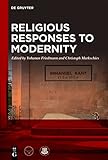Religious Responses to Modernity / ed. by Yohanan Friedmann, Christoph Markschies.
Material type: TextPublisher: Berlin ; Boston : De Gruyter, [2021]Copyright date: ©2021Description: 1 online resource (IX, 141 p.)Content type:
TextPublisher: Berlin ; Boston : De Gruyter, [2021]Copyright date: ©2021Description: 1 online resource (IX, 141 p.)Content type: - 9783110723892
- 9783110724066
- 9783110723984
- online - DeGruyter
- Issued also in print.
| Item type | Current library | Call number | URL | Status | Notes | Barcode | |
|---|---|---|---|---|---|---|---|
 eBook
eBook
|
Biblioteca "Angelicum" Pont. Univ. S.Tommaso d'Aquino Nuvola online | online - DeGruyter (Browse shelf(Opens below)) | Online access | Not for loan (Accesso limitato) | Accesso per gli utenti autorizzati / Access for authorized users | (dgr)9783110723984 |
Frontmatter -- Table of Contents -- Foreword -- The Rise and Decline of Protestant Rationalism -- Individual and Community in Modern Debates about Religion and Secularism -- The Conversion of the Jews: Identity as Ontology in Modern Kabbalah -- Catholic Europe and Sixteenth-Century Science: A Path to Modernity? -- Jewish Intellectuals on the Chimera of Progress: Walter Benjamin, Martin Buber and Leo Strauss -- Depoliticization and Denationalization of Religion: Aḥmad Luṭfī al-Sayyid and the Relocation of Islam in Modern Life -- Socrates against Christ? A Theological Critique of Michel Foucault’s Philosophy of Parrhesia -- Contributors to This Volume -- Index
restricted access online access with authorization star
http://purl.org/coar/access_right/c_16ec
The dawn of the modern age posed challenges to all of the world’s religions – and since then, religions have countered with challenges to modernity. In Religious Responses to Modernity, seven leading scholars from Germany and Israel explore specific instances of the face-off between religious thought and modernity, in Christianity, Judaism and Islam.As co-editor Christoph Markschies remarks in his Foreword, it may seem almost trivial to say that different religions, and the various currents within them, have reacted in very different ways to the “multiple modernities” described by S.N. Eisenstadt. However, things become more interesting when the comparative perspective leads us to discover surprising similarities. Disparate encounters are connected by their transnational or national perspectives, with the one side criticizing in the interest of rationality as a model of authorization, and the other presenting revelation as a critique of a depraved form of rationality. The thoughtful essays presented herein, by Simon Gerber, Johannes Zachhuber, Jonathan Garb, Rivka Feldhay, Paul Mendes-Flohr, Israel Gershoni and Christoph Schmidt, provide a counterweight to the popularity of some all-too-simplified models of modernization.
Issued also in print.
Mode of access: Internet via World Wide Web.
In English.
Description based on online resource; title from PDF title page (publisher's Web site, viewed 01. Dez 2022)


